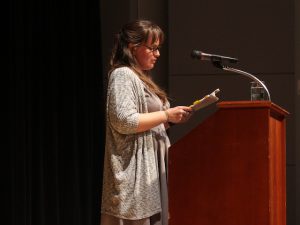By Stephanie Cepak
 I’m sitting with Iowa Poetry Prize winner Lindsay Tigue in Espresso Royale on Grand River Avenue. The coffee machine is steaming away on this mid-April day as we talk about the landscape of East Lansing, which is just coming into bloom.
I’m sitting with Iowa Poetry Prize winner Lindsay Tigue in Espresso Royale on Grand River Avenue. The coffee machine is steaming away on this mid-April day as we talk about the landscape of East Lansing, which is just coming into bloom.
The empty land next to the other coffee shop she frequented as a student is now a construction zone. High-rise apartments to-be-sprouted this coming fall. Tigue talks about coming to campus for football games with her parents and how it feels different coming back at a different time of the year.
Tigue graduated from the Honors College at Michigan State University in 2007 with a degree in English from the College of Arts & Letters. From there she went to Chicago for an internship, then France to teach English, then back to Chicago to work for a nonprofit educational publisher. Three years later, she found herself enrolling in a master of fine arts program at Iowa State University, where her poetry work eventually became her thesis and the trappings of her recently published book. These days, she finds herself on the English Ph.D. track at the University of Georgia.
The overall tone of our conversation is that even though she graduated nine years ago, the boundaries of East Lansing can feel both familiar and foreign as an alumna.
It’s no wonder that we get wrapped up in this talk about the past and present given that Tigue’s “System of Ghosts” traverses the environments we create for ourselves, and sometimes vacate.
Tigue’s muses for the book, and her creative writing in general, “really varies,” she says. News articles, recently published scientific studies, weather.com click-bait, and even a Buzz-Feed photo gallery of abandoned places all over the world.
She’s always interested in reading more and learning more about topics that cross disciplines. She credits the Honors College for allowing her to explore her varying interests right away; taking an American religious history class and two geology classes, for instance, and for her master’s program continuing that track.
“I like to use research,” she explains.
Craig Morgan Teicher, a judge for the 2015 Iowa Poetry Prize, said of Tigue’s writing, “Bits of knowledge, gathered magpie like, which others might consider trivia — the origins of the red and green on traffic lights, the different ways distant towns told time before railroads connected them, the composition of the asteroid Ceres — spur these poems toward startling personal and public insights. What Tigue is seeking in all this minutiae, all these forgotten facts, is what everyone wants, what everyone’s afraid not to find: recognition, company, balm for the aloneness that starts at the edge of everyone’s skull.”
The lyrical possibilities, the syntax, the white space of a poem all captivate Tigue’s writing. She shared her insights during a reading of her book for the Residential College in the Arts and Humanities’ Center for Poetry. And with me on this mid-April day.
